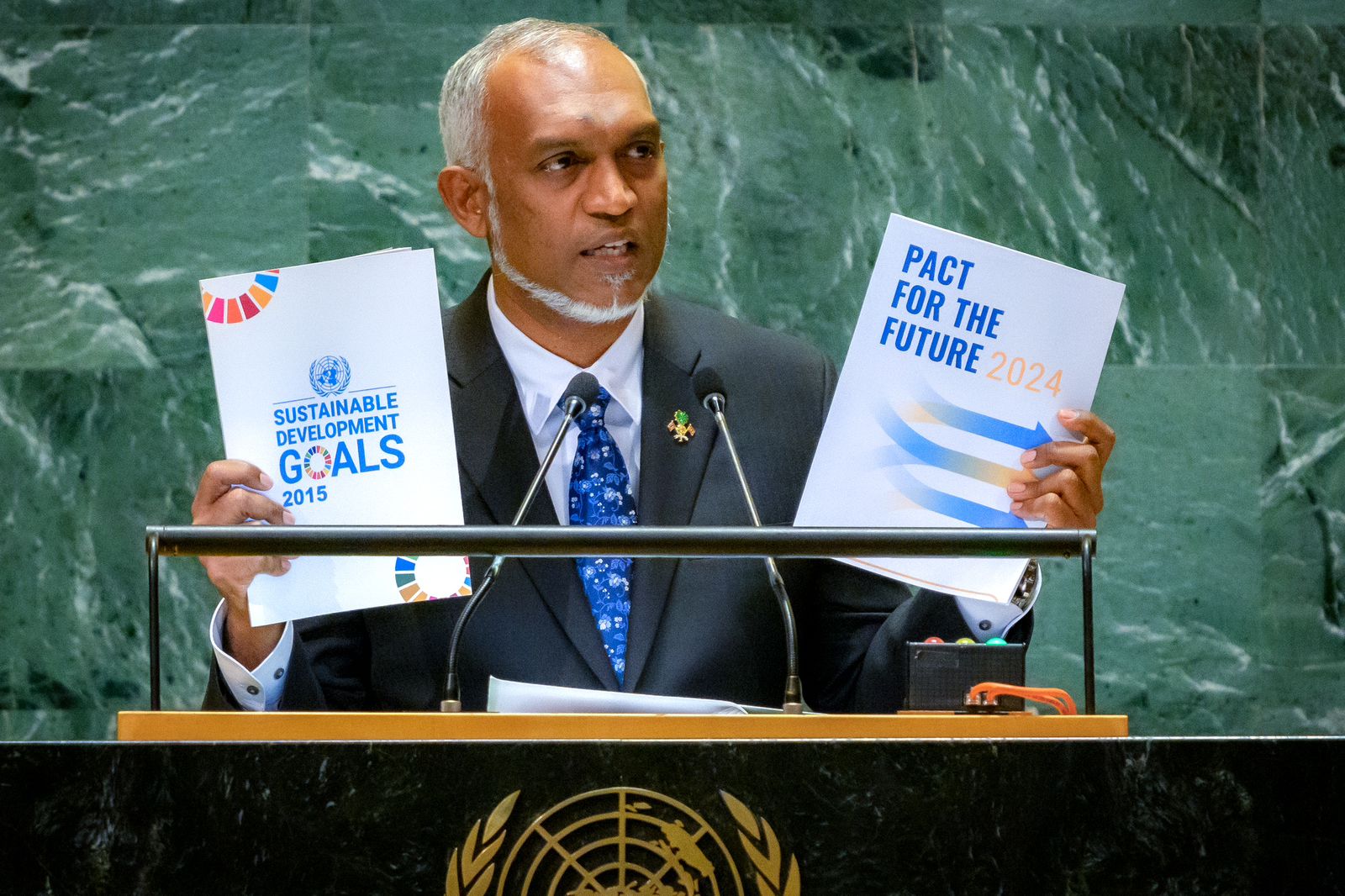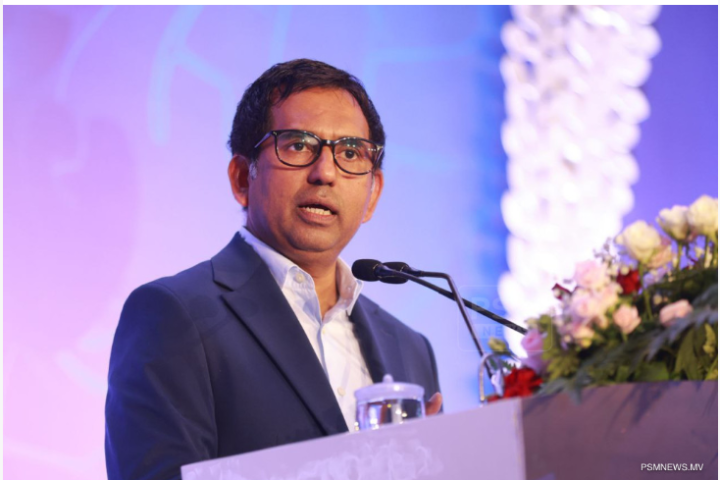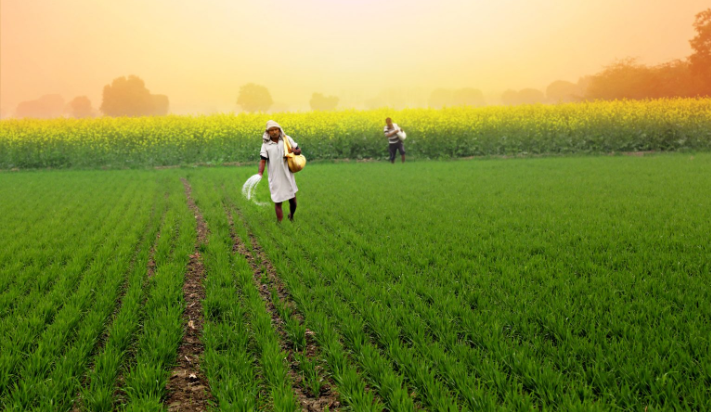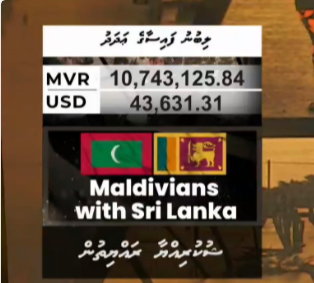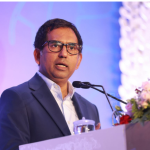New York, — In a commanding address at the United Nations General Assembly, President Dr. Mohamed Muizzu delivered a sharp critique of global inaction, warning that humanity is “deep in the red” and facing an unprecedented wave of crises that demand immediate attention. From conflict and poverty to climate change and economic inequality, Muizzu underscored the urgency for collective action, warning that no country is immune.
Humanity is in Crisis
“Let’s not mince our words today,” Muizzu began, setting a somber tone for his address.
“Humanity is in deep trouble, facing an ever-growing list of crises: conflict, poverty, hunger, climate change, the wealth gap, the cost-of-living crisis, migration, occupation, opioid addiction… the list goes on.”
In an evocative metaphor, Muizzu presented a stark visual of the global state: “I have a map here of the world with countries which are facing some sort of crisis in red. Do you see any countries in green who are not facing a crisis? You know why? Because we are all deep in the red! Humanity is in crisis!”
His words, heavy with frustration, called out global leaders for looking the other way. “And in many cases, it’s man-made!” he declared, leaving little doubt as to who he believed was responsible for the world’s current plight.
The President’s message resonated particularly strongly in the Maldives’ context—a nation that has long been on the frontlines of the climate crisis.
“We cannot afford to continue with business as usual while the alarms are ringing,” he warned. “The band is still playing the same old tunes, as the whole ship descends deeper and deeper into uncharted waters.”
A Call for a Revitalized United Nations
While Muizzu painted a bleak picture of the current global situation, he also called for reform—particularly within the very institution he was addressing. “We need Nations United in harmony, not a United Nations in misery,” he told the assembly. His message was one of both critique and hope, as he urged nations to unite in action, rather than merely talk.
“We can’t keep meeting, talking, and pledging but not doing,” Muizzu stressed. His frustration with the existing system was palpable as he posed a rhetorical question to the room: “Do we want these days to come back to haunt us—the days when we had a chance but not a will?”
The President’s speech was a pointed reminder that while smaller nations like the Maldives often bear the brunt of global inaction, it is the collective failure of the international system that allows these crises to worsen. “We don’t want these days to haunt us,” he said, repeating his call for more than just diplomatic promises. “We need to start acting, now.”
Maldives’ Perspective: A Small Nation with Big Stakes
For a country like the Maldives, vulnerable to climate change and economic shocks, Muizzu’s call for a more effective and harmonious United Nations carries real stakes. “The Maldives has always taken ownership and responsibility for its own development,” Muizzu noted, but he stressed that without international support, there are limits to what small nations can do on their own.
His plea for global reform was coupled with a vision of what a revitalized UN should look like: a body that actively enforces its decisions, drives real solutions, and adapts to the crises of today. “The United Nations is only relevant when it makes a real difference in the lives of people,” he reminded the assembly. His critique, while forceful, was grounded in the practical need for the UN to be more than just a platform for discussion.
“These are crucial times for the world, important years for my country,” Muizzu emphasized, making it clear that the Maldives—and indeed all nations—cannot afford for the UN to continue as it has. “We need the United Nations to act, not just talk.”
Standing Strong on the Global Stage
In addressing the failures of the current multilateral system, Muizzu positioned the Maldives not just as a vulnerable nation, but as a proactive player pushing for necessary global reform. “We believe the best approach to protecting fundamental rights is to cultivate a culture of respect for those rights,” Muizzu stated. His reference to human rights underscored that the Maldives is not only concerned about climate change but also about the broader human impacts of global inaction.
“In 2040, the Maldives will celebrate 75 years since regaining its independence,” Muizzu said. “As we look forward to that milestone… what can we hope to achieve? What do we wish to accomplish?”
He made it clear that the Maldives’ future depends not only on its own efforts but on global solidarity and reform, particularly within the United Nations.
Muizzu’s closing remarks were a powerful reminder of what is at stake: “Fifty-nine years ago, the Maldives reached out to the United Nations as its first port, in a sea of uncertainty. We came here, to this great Hall, seeking recognition, seeking a partner.” Today, the Maldives seeks something more—action, solidarity, and a commitment to real change.
